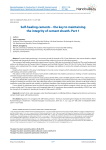Cement and other binders with mineral and organic additives. Рубрика в журнале - Nanotechnologies in Construction: A Scientific Internet-Journal

Self-healing cements – the key to maintaining the integrity of cement sheath. Part 1
Статья научная
To control water production, it is necessary to seal the channels of 20–25 mm thickness in the cement sheath at a depth of hundreds and thousands of meters. The most promising solution is the use of self-healing cements. The concept of self-healing materials has been known since the 1980s due to the studies of Donald Jud. The most fundamental works are by Sybrand van der Zwaag, Sheba D. Bergman and Fred Wudl, Richard P. Wool, D.Y Wu, N.R. Sottos, Erin B. Murphy, Henk Jonkers, who substantiated the concept, suggested technologies and additives to restore the integrity of polymer and cement materials. Despite active research in this area, Schlumberger is the only service company which elaborated and successfully applied the «self-healing» well cement called Futur. The authors of the article set the task of well cement modification that enables autonomous «healing» of water-conducting channels through which formation water migrates. The following materials were used in the study: polyacrylamide (PAA), water-swellable polymer (VNP V-615), sodium polyacrylate (SP), cross-linked PAA copolymers, active waterproofing mineral additives and swelling elastomers. Most of the additives have a degree of swelling of more than 150%, they effectively reduce a permeability of the cement stone, however multi-layer coating is required to control the speed of their swelling. A significant drawback of the analyzed materials was the complexity of the coating. A cross-linked AA copolymer based on anionic polycrylamide was the most effective reagent, which was easy to cover with a water-soluble shell. The cement stone with integrated agent of AA copolymer demonstrated a permeability of 0.0018 μm2 with the strength of the samples for bending at the age of 2 days equal to 8.0 MPa.
Бесплатно

Self-healing cements – the key to maintaining the integrity of cement sheath. Part 2
Статья научная
To control water production, it is necessary to seal the channels of 20–25 mm thickness in the cement sheath at a depth of hundreds and thousands of meters. The most promising solution is the use of self-healing cements. The concept of self-healing materials has been known since the 1980s due to the studies of Donald Jud. The most fundamental works are by Sybrand van der Zwaag, Sheba D. Bergman and Fred Wudl, Richard P. Wool, D.Y Wu, N.R. Sottos, Erin B. Murphy, Henk Jonkers, who substantiated the concept, suggested technologies and additives to restore the integrity of polymer and cement materials. Despite active research in this area, Schlumberger is the only service company which elaborated and successfully applied the «self-healing» well cement called Futur. The authors of the article set the task of well cement modification that could enable autonomous «healing» of water-conducting channels through which formation water migrates. The following materials were used in the study: polyacrylamide (PAA), water-swellable polymer (VNP V-615), sodium polyacrylate (SP), cross-linked PAA copolymers, active waterproofing mineral additives and swelling elastomers. Most of the additives have a degree of swelling of more than 150%, they effectively reduce a permeability of the cement stone, however multi-layer coating is required to control the speed of their swelling. A significant drawback of the analyzed materials was the complexity of the coating. A cross-linked AA copolymer based on anionic polycrylamide was the most effective reagent that was easily covered with a water-soluble shell. The cement stone with integrated agent of AA copolymer demonstrated a permeability of 0.0018 μm2 with the strength of the samples for bending at the age of 2 days equal to 8.0 MPa.
Бесплатно

